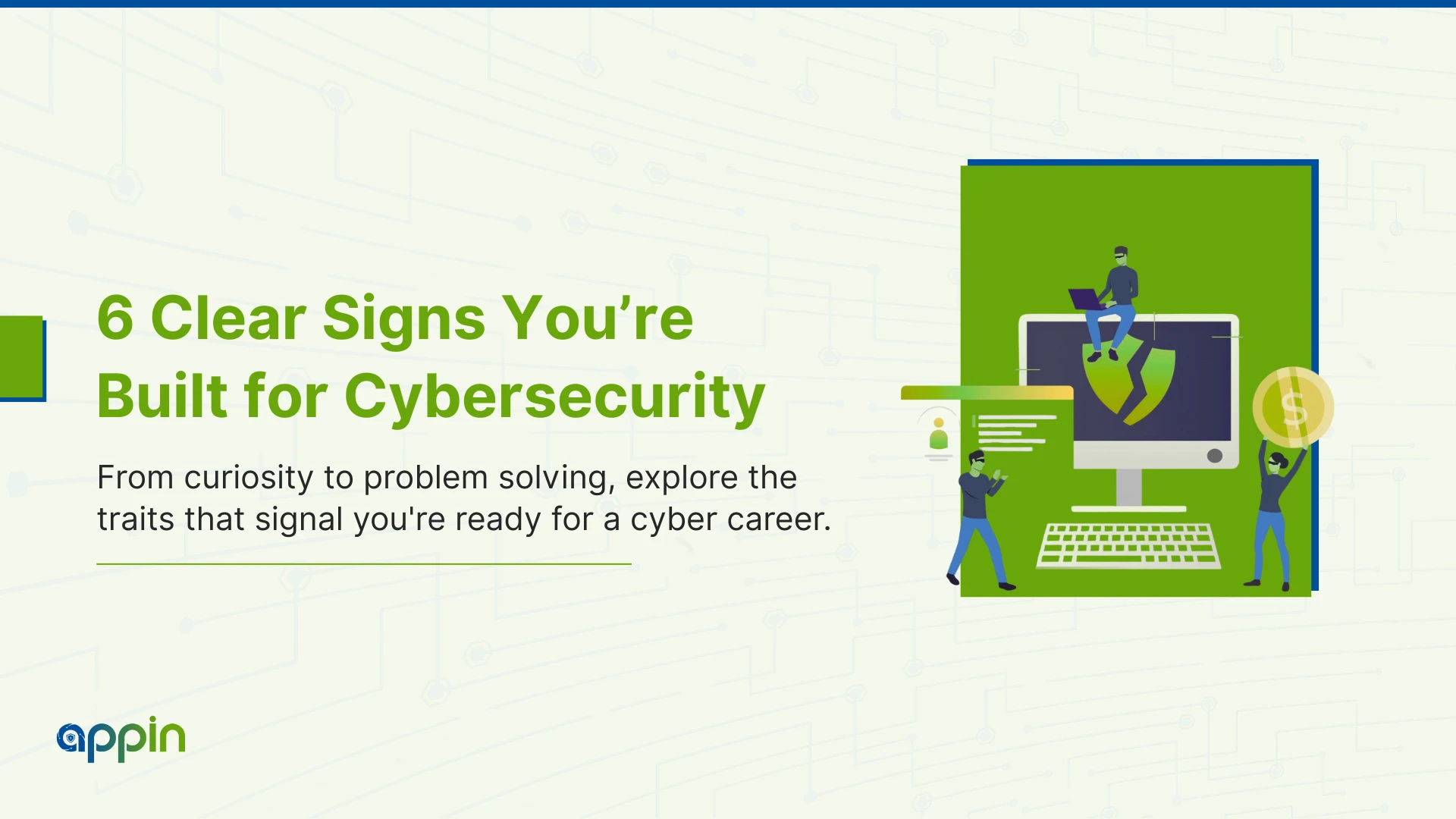In today’s digital world, choosing a career in cybersecurity can feel overwhelming. With high-profile breaches making headlines, many wonder if they have the right skills and mindset to protect critical systems.
If you’re exploring a Cyber security Certification Course or thinking about your next steps, this post will help you decide if you’re ready.
Here’s what you’ll learn:
- Six clear signs that show you have the curiosity and drive for this field
- Why problem solving and attention to detail matter day to day
- How continuous learning and hands-on practice fit into your journey
- Tips for taking your first steps toward a security role
By the end, you’ll know if a cybersecurity career in 2025 is the right path and how to move forward with confidence.
Sign 1: You Love Solving Complex Problems
An analytical mindset drives success in a career in cybersecurity. You enjoy dissecting systems, spotting hidden patterns, and linking clues to find solutions.
Key examples of security puzzles:
Log File Investigation
- Trace unauthorized access by comparing timestamps and IP addresses
- Pinpoint the source of a breach through systematic analysis
Capture the Flag Challenges
- Decode encrypted messages to reveal hidden flags
- Exploit a vulnerable form under time pressure to sharpen skills
These exercises build persistence and critical thinking:
- Break problems into smaller steps
- Test hypotheses until you find the answer
- Adapt strategies when new information appears
If you tackle logic puzzles, strategy games, or code challenges for fun, you already have the mindset to excel. To refine these skills, consider a Cyber Security Certification Course. Guided labs and real-world scenarios help you apply analytical thinking to network breaches, code injection, and more.
Sign 2: You’re Comfortable with Continuous Learning
Cybersecurity is a field that never stands still. New threats, tools, and techniques emerge every week. If you enjoy picking up fresh skills and updating your knowledge, you’ll fit right into a career in cybersecurity.
Why ongoing study matters:
- Evolving Threats such as ransomware, supply chain attacks, and zero-day exploits require new defenses
- Tool Updates when frameworks like Metasploit and OWASP ZAP release improvements regularly
- Industry Standards with regulations like GDPR evolving and demanding up-to-date security practices
Certifications play a key role in structured learning:
- A recognized cybersecurity certification validates your expertise
- Programs guide you through current best practices and emerging trends
- Earning credentials like CEH or CompTIA Security+ shows employers you commit to growth
Signs you thrive on continuous learning:
- You follow security blogs and podcasts to stay informed
- You enroll in online courses to explore new attack methods
- You join community labs and capture-the-flag events for hands-on practice
If this describes you, a Cyber security Certification Course can channel your curiosity into a clear path. With each module, you gain both theory and hands-on experience. Staying curious and committed to learning ensures you never fall behind and positions you as a valuable asset on any security team.
Sign 3: You Pay Attention to Detail
Small misconfigurations can turn into major breaches. Overlooking a single open port or missing an unusual log entry gives attackers an easy entry point. In a career in cybersecurity, precision and a sharp eye for subtle issues are essential.
Areas where attention to detail matters most:
Log Analysis
- Spot irregular login attempts or unexpected errors
- Correlate events across multiple systems to trace attack paths
Code Review
- Identify hard coded credentials or insecure functions
- Catch off by one errors that lead to buffer overflows
Configuration Files
- Ensure permissions and settings match security policies
- Check for default passwords or exposed API keys
Network Rules
- Verify firewall rules block unwanted traffic
- Confirm VPN and routing settings prevent external access
Developing these habits often requires formal training. A respected cybersecurity certification teaches you where to look and what to test. It provides real world scenarios that reinforce why every detail counts.
If you already notice minor inconsistencies in everyday tasks like a typo in a URL or a strange timestamp, you have the mindset to excel. Cultivating this attention to detail sets you apart and builds a strong foundation for a successful cybersecurity career.
Sign 4: You Understand Networking Basics
A solid grasp of TCP/IP and system architecture is crucial in a career in cybersecurity. Network layers, protocols, and device roles shape how data moves and how you test for vulnerabilities. If you already work with network settings or enjoy mapping connections, you have a head start.
Key networking concepts to master:
IP Addresses and Subnets
- Calculate subnets and identify host ranges
Ports and Protocols
- Recognize common ports such as HTTP on 80, HTTPS on 443, SSH on 22 and their purposes
OSI Model Layers
- Understand how data flows from physical signals to application payloads
Routing and Switching
- Distinguish between routers, switches and firewalls in traffic management
Network Address Translation (NAT)
- Learn how private networks connect to the internet without exposing internal IPs
These fundamentals come alive in an ethical hacking course where hands-on labs let you scan, sniff and manipulate packets. You move from theory to practice by configuring virtual networks and testing firewall rules.
If you are comfortable setting up home networks, troubleshooting Wi-Fi issues or adjusting router settings, you are ready to dive deeper. Building on this foundation ensures you can tackle advanced attacks such as network pentesting and packet analysis with confidence.
Sign 5: You Have an Ethical Mindset
Respecting legal boundaries is the foundation of a career in cybersecurity. Ethical hackers test systems only with permission and follow responsible disclosure practices. This approach builds trust and ensures your work helps organizations improve security without causing harm.
Key ethics in cybersecurity:
Authorized Testing
- Always obtain written consent before probing systems
Responsible Disclosure
- Report vulnerabilities privately to the owner, giving them time to fix issues
Data Privacy
- Avoid accessing or sharing sensitive information beyond the scope of testing
Professional Integrity
- Document your methods and findings accurately for clear audits and reports
Why ethics separate professionals from hobbyists:
- Certified experts follow established codes of conduct
- They prioritize client safety over personal gain
- Their work leads to positive security improvements, not disruption
An ethical hacking course reinforces these principles through hands-on scenarios and real-world case studies. You learn how to structure tests, write clear reports, and maintain legal compliance. Embracing ethics shows you’re ready for the responsibilities of a cybersecurity role and distinguishes you as a trusted professional.
Sign 6: You Learn Best Through Hands-On Practice
Reading about vulnerabilities is useful, but real learning comes when you apply techniques yourself. If you look forward to setting up labs, breaking into test systems, and solving live challenges, you’re on your way to a successful cybersecurity career.
Hands-on practice builds skills quickly:
- Virtual Labs let you experiment with tools like Metasploit and Nmap in a safe environment
- Capture-the-Flag Events sharpen your problem-solving under pressure by simulating real attacks
- Bug Bounty Training gives exposure to live programs where you hunt for vulnerabilities and earn rewards
A structured ethical hacking course ties all this together. Guided exercises walk you through tool setups, attack scenarios, and best practices. You gain confidence as you move from basic scans to complex exploit chains.
By getting your hands dirty in labs and bug bounty platforms, you learn to troubleshoot errors, refine your methods, and adapt to unexpected outcomes. This eagerness to learn by doing shows prospective employers you are ready for real-world duties. If you thrive on practice and experimentation, you have the mindset to excel in cybersecurity.
Take the Next Step Toward Your Cybersecurity Career
You’ve seen six clear signs that you’re ready for a career in cybersecurity:
- You love solving complex problems
- You embrace continuous learning
- You pay close attention to detail
- You understand networking fundamentals
- You hold a strong ethical mindset
- You thrive on hands-on labs and challenges
These qualities set you apart and prepare you for real-world security roles. A structured ethical hacking course turns potential into proven skills. Guided labs, expert feedback, and real scenarios help you move from theory to practice with confidence.
Ready to transform your interest into impact? Enquire Now about Appin Indore’s practical training programs. Whether you choose a certified ethical hacking course or bug bounty training, you’ll gain the credentials and hands-on experience that employers value. Take this step today and launch your cybersecurity career in 2025.






